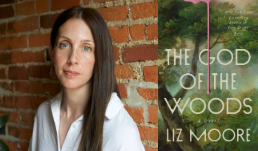- Categories:
A Q&A with Liz Moore, Author of July Indie Next List Top Pick “The God of the Woods”
- By Zoe Perzo
Independent booksellers across the country have chosen Liz Moore’s The God of the Woods (Riverhead Books) as their top pick for the July 2024 Indie Next List.

The God of the Woods begins when a teen goes missing at summer camp...exactly fourteen years after her brother disappeared under similar circumstances.
Here, Moore discusses her work with Bookselling This Week.
Bookselling This Week: The premise — teen goes missing from summer camp — is instantly gripping. How did the idea for The God of the Woods first occur to you?
Liz Moore: Years ago, I wrote a short story set at a summer camp. It was different in a lot of ways from The God of the Woods — it was set in the present day, and there was no disappearance or mystery. The only sense of foreboding in it came from the tension of being a new kid within a group of campers who have known each other for years. But its main character became my inspiration for one of the characters in The God of the Woods (Tracy Jewell, the hapless new girl whom Barbara Van Laar befriends and in whom she confides), and the camp itself, though it had a different name, became the inspiration for Camp Emerson.
I really liked being in the world of that camp, but I knew there wasn't enough narrative tension in the piece to sustain an entire novel-length work. As I've grown more interested in writing true mysteries, I began to imagine what other characters could populate this world, and to research the history of "great camps" in the Adirondacks — essentially, rustic mansions in the wilderness built and owned by dynastic American families. And then I asked, "Who might live in one of those?" And the upstairs/downstairs dynamic of the house, the camp, the family, and the staff really appealed to me.
BTW: The God of the Woods has a sizable cast of characters and covers two different time periods. Would you tell us a little about the development of this novel? What was the most challenging part of creating this story?
LM: I never outline or pre-plan, which is probably why it takes me about four years to write each novel. I like the process of discovery, and I like letting my novels take unexpected turns. But with a novel like this one, which has such a large cast of characters and a large number of time periods, it became essential (and challenging!) to find ways of keeping track of things as I wrote. I had several working documents I used to remember the chronology of the book, which I constantly updated as years and ages changed. (One day I'll learn to do all of this in Excel and I'll be unstoppable.)
BTW: The Adirondacks are a unique region, and The God of the Woods really captures its eerie beauty — and, like most regions of wilderness, it has its fair share of missing people over the years. Do you want to tell us a little more about choosing the Adirondacks as the setting for this title?
LM: I have a long family history in the Adirondacks. Four of my ancestors moved there in the early 1800s, lured from other parts of the northeastern United States by talk of plentiful arable land. But they soon discovered that the rocky mountain terrain there actually makes it difficult to sustain a farm, and they settled just south of the Adirondacks, where my grandmother and mother were born and raised.
My grandparents did build a summer home there (much different in scale than the "great camp" in the book — ours is more like a small wooden cabin). The cabin still stands; I grew up going each summer, and I bring my own children there to this day. My personal experience of the place, along with the many spooky stories — both real and invented — my family liked to tell, informed the atmosphere of the novel.
BTW: Any idea what’s next for you?
LM: I'm currently on set as the series adaptation of my last novel, Long Bright River, is filmed. I co-created and co-wrote the series and I serve as an Executive Producer as well. The series will air on Peacock in the future. I have two other novels under option as well, so we'll see what happens with those. I do really enjoy writing for television, but I think novel writing will always be my primary focus. And so this summer I'll get started on whatever my next novel will be.
BTW: Could you tell us about the role of books and indie bookstores in your life?
LM: I am a huge fan of indie bookstores. There are too many to name, but just a few of my favorite ones in Philadelphia (where I live) include Head House Books, A Novel Idea, Harriett's Bookshop, The Head & The Hand. (And for the record, my favorite bookshop in the southern Adirondacks is Northshire Bookstore, in Saratoga Springs!) For a time, before I got a tenure-track job at Temple University, I taught low-cost community writing workshops out of indie bookstores in the Philadelphia area, and I developed great relationships with many of the proprietors and employees at them. We're still in touch today.
I am so grateful to the many, many booksellers who read and recommended The God of the Woods for the Indie Next List in July. When I got the news that it was the #1 pick on the list, I almost passed out. I can think of no greater honor!

